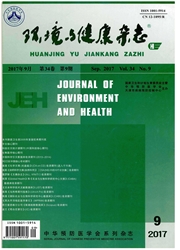

 中文摘要:
中文摘要:
研究表明,人群长期暴露可吸入颗粒物后,其心率变异性、血压、血黏度发生改变,心血管疾病的发病率和死亡率升高。可吸入颗粒物诱导血管内皮细胞氧化应激,激活细胞外调节蛋白激酶(ERK)、核转录因子-κB(NF—κB)、促分裂素原活化蛋白激酶(MAPK)、c-jun氨基末端激酶(JNK)等信号通路,促进炎症因子、组织因子、黏附因子等释放,导致心血管内皮细胞功能发生紊乱,进而诱发心血管疾病。该文综述了可吸人颗粒物对内皮细胞功能的影响及其对细胞信号通路的分子作用机制。
 英文摘要:
英文摘要:
Ambient air pollution is a growing problem in urban centers in many developing countries, resulting in a serious public health hazard. Epidemiologieal studies have demonstrated that long-term exposure to high concentrations of inhalable particulate matter (PM) may increase the risk of cardiovascular and respiratory diseases, including lung cancer and atherosclerosis. IPM-induced oxidative stress results in activation of ERK, NF-κB, MAPK and JNK signal pathway in vascular endothelial cells, which may improve the release of eytokines including proinflammatory factors, adhension factors, and tissue factors, etc. Therefore, the relationship between IPM and dysfunction of vascular endothelial cells will be reviewed in this paper.
 同期刊论文项目
同期刊论文项目
 同项目期刊论文
同项目期刊论文
 期刊信息
期刊信息
